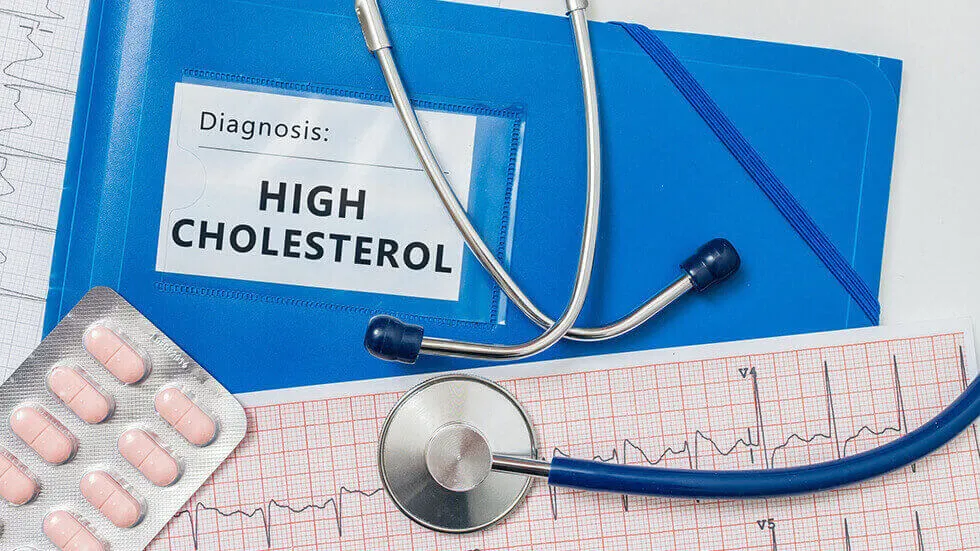


We often come across the term “high cholesterol” in discussions related to heart health and cholesterol treatment. Many of us could never understand what high cholesterol exactly is or, how detrimental it is to our heart health. These days, some people are totally unaware that they’re living with a problem of high cholesterol. But cholesterol and heart connection should be on everyone’s radar.
Cholesterol, a natural component present in our blood, contributes to normal function of cell membranes and a number of other biological functions. However, having too much of it could be harmful. Basically, there are different types of cholesterol in our blood, one of which is high density lipoprotein (HDL) cholesterol, or “good” cholesterol. High levels of some kinds of cholesterol, including low density lipoprotein (LDL) cholesterol, which is also considered “bad” cholesterol, can be harmful to your cardiovascular health. If your blood contains too much bad cholesterol, it’s known as high cholesterol. When left untreated, you’re at an in increased risk of heart attack and stroke. So, for the prevention of heart problems, cholesterol treatment becomes extremely important. Cholesterol, combined with other risk factors such as high blood pressure, increases your risk of heart-related problems even more.
To reduce the risk of problems related to heart, cholesterol treatment is necessary. The effects of high cholesterol effects on heart health are serious and this shouldn’t be taken lightly. While cholesterol is essential for the body at normal levels, it becomes a silent danger for your heart health when its concentrations become too high. This is how high cholesterol leads to heart attack–
While unhealthy levels of cholesterol contribute to major problems related to heart, cholesterol symptoms are usually not overt. Some people think that they’ll be able to feel cholesterol symptoms if they have high cholesterol. Contrary to what they think, you may not know you have elevated levels of cholesterol until it is too late—when you experience a cardiac event. As with diabetes, hypertension and other conditions that cause heart disease, the lack of signs and symptoms doesn’t mean that you need not to worry about it. 5 Only in some cases, high cholesterol may lead to Xanthomas, a dermatologic condition in which people develop yellowish growths on their skin. These people may have high cholesterol levels. As there are no symptoms of high cholesterol in the vast majority of cases, having this condition can place you at an increased risk of a cardiac event. If you have this condition over many years, your risk of heart attacks and strokes might be higher than normal for your age. If you’re someone in your 20s or 30s, it’s extremely important for you to do something about your unhealthy cholesterol levels now.
People with heart disease and unhealthy cholesterol levels, may have serious heart health problems such as congestive heart failure, heart attack, or heart rhythm problems. Because all these issues can result in death, cholesterol treatment for heart disease patients becomes important. The cholesterol and heart disease treatment options for patients vary depending on the type of heart disease they have. The most common strategies include making small lifestyle changes, taking medications as prescribed and undergoing surgery. In most of the cases, doctors recommend patients to make important lifestyle changes and encourage them for heart-healthy living. Depending on your condition, your doctor may also prescribe you the best medicines for cholesterol treatment and you should continue taking them in recommended dosage as prescribed. In those with unhealthy cholesterol levels, taking cholesterol medications helps lower their levels of LDL cholesterol and raise their HDL, or good cholesterol levels. This cholesterol treatment lowers their risk of plaque buildup, reducing their chances for having another cardiac event. Many doctors recommend treating anyone with heart disease with cholesterol-lowering medications. To strengthen your heart health, it’s worth making these cholesterol-lowering medications part of your normal routine.
High cholesterol and heart disease prevention is important to live a longer, healthier life. Preventing high cholesterol and heart disease involves a range of healthy behaviors –
– Include grains, legumes, nuts, fresh and vegetable and fruits and foods rich in omega-3 fatty acids such as salmon in your diet
– Avoid high-cholesterol foods such as fast foods and processed meats.
– Cut back on tras fats, sodium and added sugars-Use the nutrition facts label on packaged foods.
As high cholesterol has no symptoms, you may not know you have cholesterol problem until it is too late. Individuals should see their healthcare provider on a regular basis to undergo screenings and blood tests and know their cholesterol numbers. Risk assessment is an important aspect of heart disease prevention, which is why Making India Heartstrong website helps you calculate your individual risk of developing heart disease. Also, know your heart disease risk, steps for recovery, and more by visiting Making India Heartstrong website and keep heart diseases out of your life – for good.
Yes. Having high cholesterol leads to building up of fatty material in the arteries. This buildup, which occurs over time, makes it harder for blood to flow through and leads to a heart attack.9
High levels of LDL, or “bad” cholesterol in blood can lead to buildup of artery-clogging plaque which results in heart disease. High levels of HDL or “good” cholesterol can reduce your risk of heart disease and stroke.
High cholesterol has no signs or symptoms. The only way is to get your cholesterol checked. A simple blood test, called a “lipid profile,” can be done to measure your cholesterol levels.
Most adults should get their cholesterol checked every 4 to 6 years even if they are at low risk of developing cardiovascular disease. People with diabetes and other risk factors should get it checked more frequently.
There’s an increased risk of having a heart attack when your total cholesterol levels are 240 mg/dl and above.This unhealthy level raises the chance of blockage in the heart which may result in sudden heart attack.